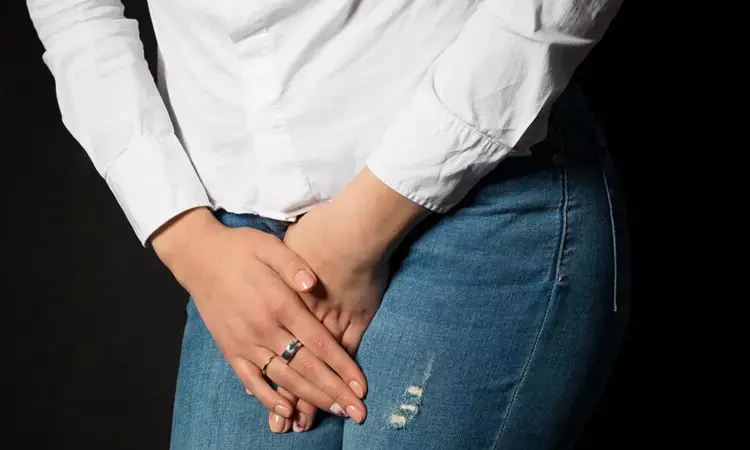- Home
- Medical news & Guidelines
- Anesthesiology
- Cardiology and CTVS
- Critical Care
- Dentistry
- Dermatology
- Diabetes and Endocrinology
- ENT
- Gastroenterology
- Medicine
- Nephrology
- Neurology
- Obstretics-Gynaecology
- Oncology
- Ophthalmology
- Orthopaedics
- Pediatrics-Neonatology
- Psychiatry
- Pulmonology
- Radiology
- Surgery
- Urology
- Laboratory Medicine
- Diet
- Nursing
- Paramedical
- Physiotherapy
- Health news
- Fact Check
- Bone Health Fact Check
- Brain Health Fact Check
- Cancer Related Fact Check
- Child Care Fact Check
- Dental and oral health fact check
- Diabetes and metabolic health fact check
- Diet and Nutrition Fact Check
- Eye and ENT Care Fact Check
- Fitness fact check
- Gut health fact check
- Heart health fact check
- Kidney health fact check
- Medical education fact check
- Men's health fact check
- Respiratory fact check
- Skin and hair care fact check
- Vaccine and Immunization fact check
- Women's health fact check
- AYUSH
- State News
- Andaman and Nicobar Islands
- Andhra Pradesh
- Arunachal Pradesh
- Assam
- Bihar
- Chandigarh
- Chattisgarh
- Dadra and Nagar Haveli
- Daman and Diu
- Delhi
- Goa
- Gujarat
- Haryana
- Himachal Pradesh
- Jammu & Kashmir
- Jharkhand
- Karnataka
- Kerala
- Ladakh
- Lakshadweep
- Madhya Pradesh
- Maharashtra
- Manipur
- Meghalaya
- Mizoram
- Nagaland
- Odisha
- Puducherry
- Punjab
- Rajasthan
- Sikkim
- Tamil Nadu
- Telangana
- Tripura
- Uttar Pradesh
- Uttrakhand
- West Bengal
- Medical Education
- Industry
Effective and Safe: Polycarbophil Vaginal Gel Extends Relief for Vaginal Atrophy in Menopausal Women, study reveals

Italy: A comprehensive study, known as the TRIPLE study, has delved into the effects of polycarbophil vaginal gel on vaginal atrophy among peri- and post-menopausal women, shedding new light on effective treatments for this common condition.
In peri- and post-menopausal women, polycarbophil vaginal gel (PCV) administration rapidly improves vaginal atrophy (VA) symptoms, and its efficacy is further increased by prolongation up to 6 months. The findings were published online in the European Journal of Obstetrics & Gynecology and Reproductive Biology on June 27, 2024.
Vaginal atrophy is a significant concern for many women during and after menopause that results from declining estrogen levels that lead to thinning, dryness, and inflammation of the vaginal walls. These symptoms can cause discomfort, pain during intercourse, and even urinary symptoms, significantly impacting quality of life.
Angelo Cagnacci from the Genetic and Sciences of the Mother and the Infant in Genoa, Italy, and colleagues aimed to evaluate the efficacy of polycarbophil vaginal gel in treating symptoms of vaginal atrophy of peri- and post-menopausal women.
For this purpose, the researchers progressively enrolled and treated sexually active women in peri- (n = 29) and post-menopause (n = 54) suffering from VA for 30 days with PCV. Those wishing to continue (n = 73) were given an additional 180 days of treatment. PCV was administered as one application twice a week.
The study assessed the vaginal health index (VHI, ranging from 5 to 25) and visual analog scores (VAS, ranging from 0 to 100 mm) for symptoms such as vaginal dryness, pain, and irritation during intercourse. Additionally, it evaluated the global symptom score (GSS, ranging from 1 to 15) and treatment safety at the beginning and after 30 days. Participants who continued treatment underwent a follow-up evaluation after an additional 180 days.
The following were the key findings of the study:
· Women in peri and post-menopause were of 48.7 ± 3.3 years and 57.5 ± 5.7 years old., respectively.
· At baseline, all outcomes were significantly worse in the postmenopausal group, except the VHI.
· After 30 days, VHI increased by 4.1 ± 0.5 (mean ± SE), and 5.1 ± 0.4 in peri- and post-menopausal women respectively.
· VAS of vaginal dryness decreased by −24.4 ± 3.6, and −52.7 ± 2.6, VAS of irritation decreased by −18.6 ± 4.4 and −47.8 ± 3.2, VAS of pain decreased by −26.2 ± 4.3 and −55.6 ± 3.1, and the GSS decreased of −3.9 ± 0.3, and −4.9 ± 0.2, in peri and post-menopausal women, respectively.
· All the modifications were significantly greater in postmenopausal women, and after 30 days, all outcomes were similar in the two groups of women.
· In comparison to baseline, after 210 days of treatment, VHI increased by 7.7 ± 0.3, VAS of vaginal dryness decreased by –53.6 ± 1.9 VAS of irritation by −42.6 ± 1.4 VAS of the pain of −46.7 ± 2.3 and the GSS of −6.5 ± 0.2 ± 0.2.
· All outcomes improved over the values observed after 30 days of treatment. No side effect was reported.
In conclusion, the 30-day administration of PCV in treating symptoms of VA was effective in postmenopausal women, as previously published in perimenopausal women-.
Treatment prolongation up to 210 days was safe and further led to vaginal atrophy improvement and its symptoms in both peri- and postmenopausal women.
Reference:
https://doi.org/10.1016/j.ejogrb.2024.06.033
Dr Kamal Kant Kohli-MBBS, DTCD- a chest specialist with more than 30 years of practice and a flair for writing clinical articles, Dr Kamal Kant Kohli joined Medical Dialogues as a Chief Editor of Medical News. Besides writing articles, as an editor, he proofreads and verifies all the medical content published on Medical Dialogues including those coming from journals, studies,medical conferences,guidelines etc. Email: drkohli@medicaldialogues.in. Contact no. 011-43720751


